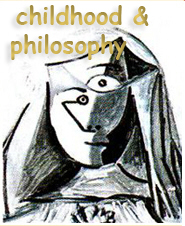encounter with philosophers in the classroom: the wratec model of community of inquiry in action
Keywords:
WRATEC, Cognitive skills, Method of discussion, Community of inquiryAbstract
The WRATEC model offers a toolbox of effective strategies for helping teachers conduct a community of inquiry in the classroom, through structured discussion. WRATEC facilitates teaching and learning through a self-corrective framework by integrating the four dimensions of cognitive skills characterized by Mathew Lipman (1991)--that is, inquiry, reasoning, information-organizing and translation skills. WRATEC is an acronym for: “W” (What is the meaning of ..); “R” (exploring the reasons for the premises given that lead to conclusions); “A” (detecting assumptions within sentences or concepts formed); “T” (verifying the truth or falsehood of the conclusion or inference); “E” (providing examples in support of the truth or falsifiability of the assumptions); “C” (exploring alternatives or counter-examples for the relativity of contexts of meaning). The seventh step (“S”) that concludes the process of the seven habits of effective thinkers (hence sometimes presented as WRATECS) lies in the skill of summarizing, which can also be expressed in written form. The WRATEC model offers an effective framework for the development of the cross-curricular competencies that inform intellectual, social and methodological skills. As is evidenced in the new education programs of several states or provinces, particularly in Canada, one of the priorities in teaching and learning programs is the development of such skills in the context of communal discourse and cooperative inquiry. The visual thought-map of WRATEC also makes it possible to trace progress in the breadth and complexity of ideas and the depth of inquiry in moving toward higher levels of generality, in ways that actualize the progress of inquiry as represented in the Platonic allegory of the cave--from opinion and belief to the examination of the validity of assumptions and the evaluation of the nexus of ideas involved in any given argument.Downloads
Download data is not yet available.
Downloads
Published
2012-02-08
Issue
Section
experiences



